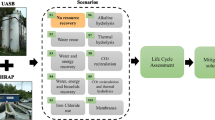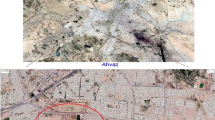Abstract
The objective of this study is to assess the environmental sustainability of a large water treatment plant through life cycle assessment (LCA) approach. This study is a pioneering one that explores the environmental impacts of a water treatment plant in Turkey by using the data collected from an actual plant. Decision makers of the treatment plant under investigation, operators of similar installations, and the scientific researchers that work on LCA of water treatment facilities are defined as the target audience. GaBi software is used for the LCA model, and CML 2001 method is adopted to calculate the results given per 1 m3 water ready to be distributed to the city. The plant serves about 2,600,000 people generating a maximum potable water flow rate of 400,000 m3/day. In the facility, 0.57 kWh of electricity is required to obtain 1 m3 of water. Of this total electricity consumption, 85% is allocated to inlet and outlet pumping stations. The results denote that the environmental impacts are dominated by electricity consumption that in turn depends on the energy source/s adopted. Sensitivity analysis on energy sources reveals the following outcomes: In case of using hard coal as energy source rather than grid mix, impacts are increased apart from freshwater aquatic ecotoxicity potential, ozone layer depletion potential, and abiotic depletion potential elements. Once solar panels are used instead of grid mix, values for all impact categories except abiotic depletion potential elements and human toxicity potential are lowered. The usage of wind turbines in place of grid mix results in 29 to 84% reductions in all investigated impact categories. The best option to decrease the environmental impacts is attained when energy is generated using wind turbines. As pumps having 90% efficiency replace the pumps with 60% efficiency, reductions ranging from 15 to 24% on all impact categories are obtained. The work performed for this study should be further pursued to obtain more representative inventory data for countries with scarce LCA studies.






Similar content being viewed by others
References
Amores MJ, Meneses M, Pasqualino J, Antón A, Castells F (2013) Environmental assessment of urban water cycle on Mediterranean conditions by LCA approach. J Clean Prod 43:84–92
Atilgan B, Azapagic A (2015) Life cycle environmental impacts of electricity from fossil fuels in Turkey. J Clean Prod 106:555–564
Atilgan B, Azapagic A (2016a) An integrated life cycle sustainability assessment of electricity generation in Turkey. Energy Policy 93:168–186
Atilgan B, Azapagic A (2016b) Renewable electricity in Turkey: life cycle environmental impacts. Renew Energy 89:649–657
Atmaca A (2016) Life cycle assessment and cost analysis of residential buildings in south east of Turkey: part 1—review and methodology. Int J Life Cycle Assess 21:831–846
Atmaca N (2017) Life-cycle assessment of post-disaster temporary housing. Build Res Inf 45(5):524–538
Baskurt M, Kocababuc I, Binici E, Dulekgurgen E, Karahan Ozgun O, Taslı R (2017) Life cycle assessment as a decision support tool in wastewater treatment plant design with renewable energy utilization. Desalin Water Treat 93:229–238
Baydar G, Ciliz N, Mammodov A (2015) Life cycle assessment of cotton textile products in Turkey. Resour Conserv Recycl 104:213–223
Bergamasco R, Konradt-Moraes LC, Vieira MF, Fagundes-Klen MR, Vieira AMS (2011) Performance of a coagulation–ultrafiltration hybrid process for water supply treatment. Chem Eng J 166(2):483–489
Biswas WK, Yek P (2016) Improving the carbon footprint of water treatment with renewable energy: a Western Australian case study. Renewables: wind, water, and solar 3(1):14
Bonton A, Bouchard C, Barbeau B, Jedrzejak S (2012) Comparative life cycle assessment of water treatment plants. Desalination 284:42–54
Boulay AM, Bouchard C, Bulle C, Deschênes L, Margni M (2011) Categorizing water for LCA inventory. Int J Life Cycle Assess 16(7):639–651
Capitanescu F, Igos E, Marvuglia A, Benetto E (2015) Coupling multi-objective constrained optimization, life cycle assessment, and detailed process simulation for potable water treatment chains. Journal of Environmental Accounting and Management 3(3):213–224
Cheng CL (2002) Study of the inter-relationship between water use and energy conservation for a building. Energy and Buildings 34(3):261–266
Del Borghi A, Strazza C, Gallo M, Messineo S, Naso M (2013) Water supply and sustainability: life cycle assessment of water collection, treatment and distribution service. Int J Life Cycle Assess 18(5):1158–1168
EUAS, 2016. Energy is the keystone of industrialization and development, Final report, The Electricity Generation Corporation of Turkey.
Friedrich E, Buckley C (2002) The use of life cycle assessment in the selection of water treatment processes. Water Research Commission (WRC) Report, (1077/1), 02
Friedrich E, Pillay S, Buckley C (2007) The use of LCA in the water industry and the case for an environmental performance indicator. Water SA 33(4):443–451
Friedrich E, Pillay S, Buckley C (2009) Environmental life cycle assessments for water treatment processes - a South African case study of an urban water cycle. Water SA 35(1):73–84
Ghaffour N, Missimer TM, Amy GL (2013) Technical review and evaluation of the economics of water desalination: current and future challenges for better water supply sustainability. Desalination 309:197–207
Goga, T. 2016. A comparative life cycle assessment (LCA) of water treatment plants using alternative sources of water (seawater and mine affected water). Master’s Thesis, School of Engineering, College of Agriculture, Engineering and Science, University of KwaZulu-Natal, Durban, South Africa, 145 pages.
Gunkaya Z, Ozdemir A, Ozkan A, Banar M (2016) Environmental performance of electricity generation based on resources: a life cycle assessment case study in Turkey. Sustainability 8:1097
He, C., Liu, Z. and Hodgins, M. 2013. Using life cycle assessment for quantifying embedded water and energy in a water treatment system. Water Research Foundation, 110 pages.
Homaki K, Nielsen PH, Sathasivan A, Bohe ELJ (2003) Life cycle assessment and environmental improvement of residential and drinking water supply systems in Hanoi, Vietnam. International Journal of Sustainable Development & World Ecology 10(1):27–42
Ilhan A, Bilgili M (2016) An overview of Turkey’s offshore wind energy potential evaluations. Turkish Journal of Scientific Reviews 9(2):55–58
Klopffer W, Curran MA (2014) How many case studies should we publish, if any? Int J Life Cycle Assess 19:1–2. https://doi.org/10.1007/s11367-013-0667-0.
Lemos D, Dias AC, Gabarrell X, Arroja L (2013) Environmental assessment of an urban water system. J Clean Prod 54:157–165
Mery Y, Tiruta-Barna L, Benetto E, Baudin I (2013) An integrated process modelling-life cycle assessment tool for the assessment and design of water treatment processes. Int J Life Cycle Assess 18(5):1062–1070
MoENR, 2017. 2015–2019 Strategic plan, Turkish Ministry of Energy and Natural Resources, November, 138 pages.
Ortiz, I. M., 2006. Life cycle assessment as a tool for green chemistry: application to different advanced oxidation processes for wastewater treatment. Doctorat en Ciències Ambientals, Universitat Autonoma de Barcelona, 268 pages.
Ozkan E, Elginoz N, Germirli Babuna F (2017) Life cycle assessment of a printed circuit board manufacturing plant in Turkey. Environ Sci Pollut Res 25:26801–26808. https://doi.org/10.1007/s11356-017-0280-z
Racoviceanu A, Karney BW, Kennedy CA, Colombo AF (2007) Life-cycle energy use and greenhouse gas emissions inventory for water treatment systems. Journal of Infrastructure Systems, ASCE 13:261–270
Raluy G, Serra L, Uche J (2006) Life cycle assessment of MSF, MED and RO desalination technologies. Energy 31(13):2361–2372
Rodriguez OO, Villamizar-Gallardo RA, García RG (2016) Life cycle assessment of four potable water treatment plants in Northeastern Colombia. Revista Ambiente & Água 11(2):268–278
Solarex Magazine (2017) http://solarexmagazine.com/turkiyenin-en-buyuk-yuzer-gunes-enerjisi-sistemi-buyukcekmece-golu-uzerine-kurulacak/. Accessed January 2017
Sombekke HDM, Voorhoeve DK, Hiemstra P (1997) Environmental impact assessment of groundwater treatment with nanofiltration. Desalination 113(2–3):293–296
TSI, 2005. Water quality-water intended for human consumption, TSI 266.
Vince F, Aoustin E, Bréant P, Marechal F (2008) LCA tool for the environmental evaluation of potable water production. Desalination 220(1–3):37–56
Zine MB, Hamouche A, Krim L (2013) The study of potable water treatment process in Algeria (boudouaou station)-by the application of life cycle assessment (LCA). J Environ Health Sci Eng 11(1):37
Acknowledgements
The authors wish to thank the staffs of Buyukcekmece Water Treatment Plant (located in Istanbul, Turkey) for their cooperation and would like to express deep appreciation to Chief Technical Advisor Mr. Cengiz Ileten for sharing his valuable knowledge.
Author information
Authors and Affiliations
Corresponding author
Additional information
Responsible editor: Philippe Loubet
Rights and permissions
About this article
Cite this article
Saad, A., Elginoz, N., Germirli Babuna, F. et al. Life cycle assessment of a large water treatment plant in Turkey. Environ Sci Pollut Res 26, 14823–14834 (2019). https://doi.org/10.1007/s11356-018-3826-9
Received:
Accepted:
Published:
Issue Date:
DOI: https://doi.org/10.1007/s11356-018-3826-9




